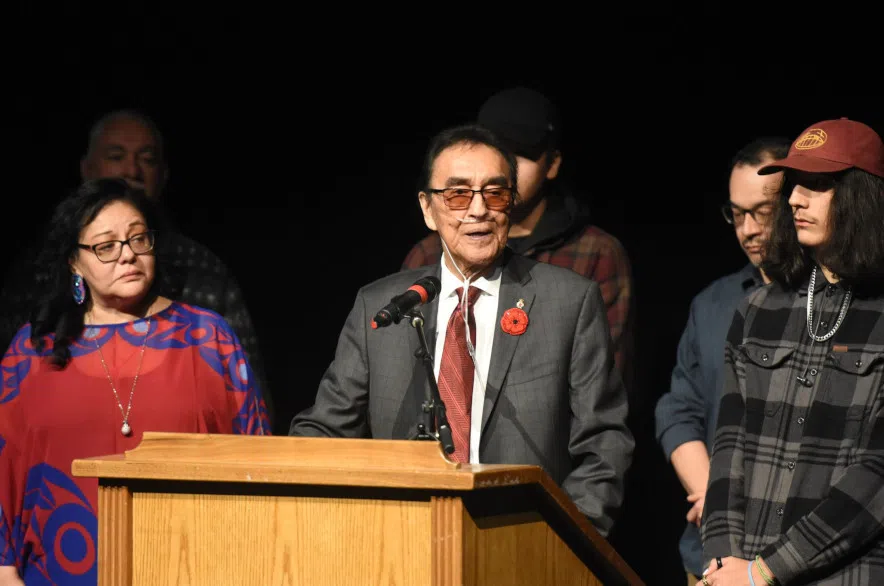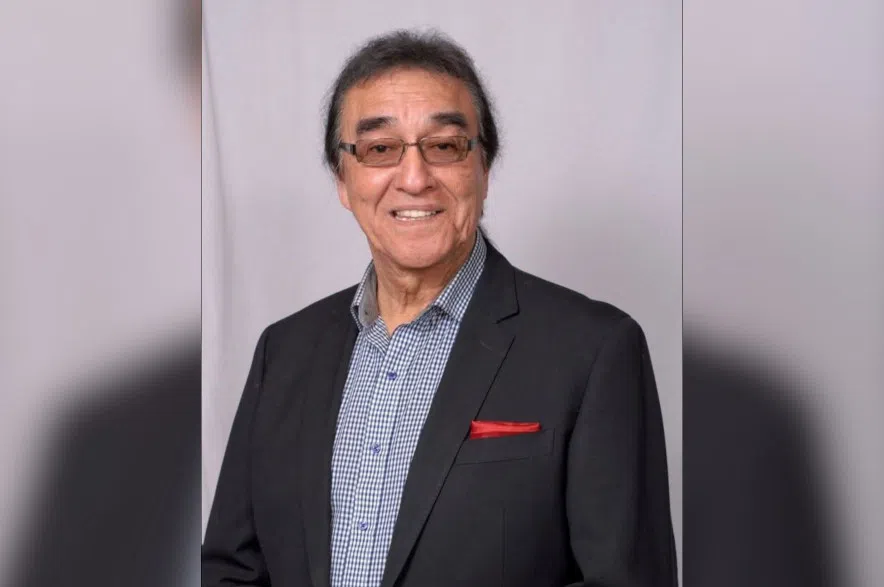Chief Lawrence Joseph’s skills and accomplishments ranged far and wide — from music, to politics, to spirituality — and he used those skills to help, advocate and heal throughout his life.
A former Federation of Sovereign Indigenous Nations (FSIN) Chief and member of Big River First Nation, Joseph died just after 7:30 p.m. on Sunday night at the age of 79.
Read more:
- FSIN marks 15 years since Stonechild Inquiry with update on police oversight in province
- James Smith Cree Nation acknowledges those who helped after mass stabbings in 2022
- NDP win stands after Desnethe-Missinippi-Churchill River recount
Joseph worked in the federal public service for 30 years and served two terms on the Prince Albert City Council in the 1990s. He served as Vice-Chief of the FSIN for nearly a decade and was elected Chief of the FSIN in 2006 and honoured as a lifetime Chief of the FSIN in 2022.
His son Kevin Joseph said that being a public servant was very important to his father.
“Some of my earliest memories … (include) volunteering for seniors, volunteering for the disabled.
“I remember that when we were very young, my dad would just say, ‘This is what we’re doing this Saturday.’ And it was never a bad thing …like we were being forced to, it was just like you get up for breakfast, you get washed up for work, you volunteer. If you’re part of the community, you do something for the community,” he said.
Kevin said that his father was always there to help and assist the community.
“When we grew up, it was always a given that we’re going to have a place set at our kitchen table for whoever might show up. And we always had people showing up. That was my dad’s concept of leadership,” he said.
Kevin said the final 24 hours of his father’s life really showcased the kind of man he was.
“The night before he passed away, he told my mom, ‘I need to take you out’. He took her to the casino. They went on a date. He took his oxygen off —which he’s been wearing for years — for a couple of hours because he wanted to feel normal again,” he said.
“The next day, he insisted we have Easter supper, family supper. He could barely move, he could barely talk, but he stayed with us for the whole supper.
“We knew he wasn’t good. We were going to call the ambulance. He said, ‘no, call the bishop. I want communion.’ The bishop came over and gave him communion and my dad found the energy to say thank you.
“‘Thank you for this day. Thank you for this life. Thank you for these last few breaths, which I’m going to take and I’m going to enjoy. Thank you for the music you gave me. Thank you for my great-grandchildren, my grandchildren, and my children. Thank you for every day. Thank you for the military I served in. Thank you to the FSIN, which I served in. Thank you to the city of Prince Albert, which I served in.’
“At no point did he say ‘I was the leader of’ — he said ‘I served.’ And when he said thank you with his dying breath, that is what he meant,” Kevin said.
Current FSIN Chief and Joseph’s nephew Bobby Cameron said he had spoken with Joseph on Saturday night, and he’d been giving advice and help up to the very end.
“He guided me and advised me throughout my councillor’s position at the Witchekan Lake First Nation and now currently as the Chief of the FSIN. He played a very significant role in my position, along with thousands of other people who he had guided and advised and helped heal along the way during his lifetime,” said Cameron.
He was vice-chief of the justice portfolio when the Neil Stonechild incident and starlight tours in Saskatoon came to light.
“He helped address it and helped get to the point where city police and others would have and recognize the First Nations jurisdiction in the area of justice,” explained Cameron.
When he was chief, Joseph created a First Nations police task force that investigated complaints against police from Indigenous people.
Cameron said Joseph was passionate when he spoke about inherent and treaty rights, particularly when it came to the issue of First Nations children being taken by government and agencies and justice for First Nations people.
Joseph was a residential school survivor, a Canadian Forces veteran, a man of the church and an accomplished musician.
“He sure loved to sing,” said Cameron.
Joseph hosted the Saskatchewan Country Music Awards twice and in 2024 was given the first-ever Willard Ahenakew lifetime achievement award at the first Saskatchewan Indigenous Music Awards, with the board reportedly saying it was a unanimous decision.
“The list goes on and on … what he did and how he lived his life. He lived his life to the fullest extent, he lived it with his heart. And his biggest accomplishment by far was his wife and his children, his grandchildren and his great-grandchildren,” said Cameron.
Joseph was also a jokester.
“There was a time to joke and time to be serious and he combined both — he was magical that way,” said Cameron.
“In First Nations culture, laughter is good medicine but it’s also a way of advising — he had that unique ability to … combine laughter and seriousness, when to be serious and how to get his message across.”
He was a man to look up to, Cameron said, and will continue to be.
Joseph died at his home in Prince Albert, and his funeral is scheduled for Thursday at St. Alban’s Anglican Cathedral.
— with files from 650 CKOM’s David Kirton, CJME News and 980 CJME Roman Hayter
Read more:












